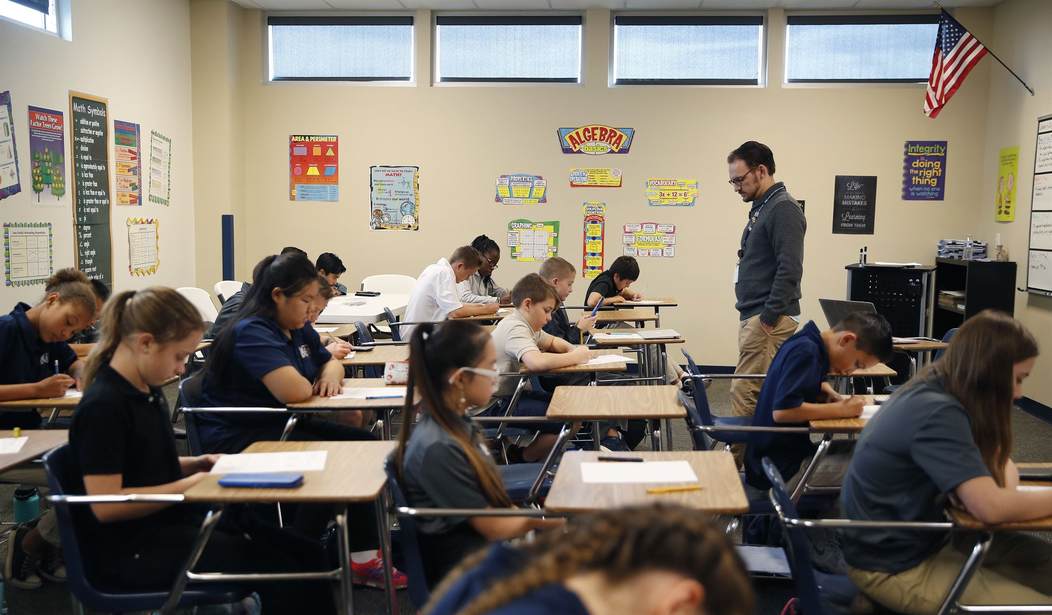President Donald Trump wasn't elected for his empathy. He was elected to kick the Washington establishment -- the bipartisan courtiers of our modern Versailles on the Potomac -- in their sensitive parts.
Kick them he did, repeatedly. And they fought back, swinging their corporate media hatchets at his head, so he slammed his "Fake News" war club into their guts.
Now, with the election just months away, both sides seem out of breath, like TV wrestlers, exhausted, with folding chairs broken in pieces on the floor of our shabby national political amphitheater.
The Democrats built exhaustion into their strategy after Trump's 2016 election, and Trump has helped them with his brutal Twitter thumbs and commentary. In many ways, Trump is his own worst enemy.
So, this (virtual) Republican National Convention is every bit an infomercial as was the (virtual) Democratic offering days before. But this one is about counterprogramming.
It may be Trump's last chance to reframe himself, to offer something to parents sitting on the fence who seek a reason to walk away from the Democrats.
What Republicans offered those parents on the RNC opening night was this:
School choice, to allow black and brown families a chance to escape the big-city public schools that have failed their kids for decades.
"I don't care if it's a public, private, charter, virtual or a home school," said South Carolina Sen. Tim Scott, a Black Republican, in his stirring speech. "When a parent has a choice, a kid has a better chance."
Just then I thought I heard heads exploding among liberal pundits and the bosses of the teachers' unions, the ground troops of the modern Democratic Party. They just hate that social media #WalkAway campaign by Democratic voters who've decided to leave the party.
Recommended
Trump's critics in the Democratic Media Complex along the Washington Beltway loathe his voters for rejecting their liberal wisdom. This blinds them and causes them to underestimate Trump.
It might surprise them to know that parents may care more about their children's education than political ideology.
Many black parents know they've been taken for granted by the Democrats for decades. They look for a chance to walk away.
Hispanic parents may have resentment toward Trump over the immigration issue, but in Chicago at least, many take advantage of charter schools -- a testament to the fact that traditional public schools don't work for them.
And those swing voters among suburban soccer moms have already identified themselves as somewhat guilty about their status, perhaps one reason for those hate-has-no-home-here signs in front lawns.
They all want a reason to feel good about themselves when they vote. And they all have this in common. They're parents.
Will school choice work as a bridge from Republicans to those parents? I don't know.
The left's cancel culture is indeed powerful. Voters fear being mocked, which may explain the rise of those defining themselves as "undecided."
But optimism, rather than fear, will give them a place to stand as the election draws near. And school choice is all about optimism.
Another school-choice advocate speaking on the RNC opening night was Rebecca Friedrichs, the California public school teacher who fought her union's ability to take dues from teachers who oppose their union's politics.
Friedrichs said teachers' unions continue "trapping so many precious, low-income children in dangerous, corrupt and low-performing schools."
Another was Georgia Democratic state Rep. Vernon Jones, a black man, who lauded school choice as a chance for black voters to walk away.
"The Democratic Party does not want black people to leave the mental plantation they've had us on for decades," Jones said. "But I have news for them: We are free people with free minds."
Trump's Republican Party did not offer a formal platform, but a wish list. School choice is prominent. Yes, states and local school districts run the schools, and I don't like federal mandates from on high.
But it's obvious that Republicans will push school choice in the campaign.
Those of us who've seen the decades of failure of Democratic-run big-city schools -- and the bigotry of low expectations built into those corrupt political systems -- see school choice as a civil rights issue.
Republicans portray Democrats as seeking the end of Western civilization, tearing down statues, burning cities. Democrats paint Republicans as racists, relying on identity politics to organize the hatreds.
But swing voters don't want more fire. They don't seek anger. They seek optimism.
Elections aren't only about feeling good about a candidate. They're about helping voters feel good about themselves.
At their convention, the Democrats slammed Trump for his handling of the coronavirus, and pushed empathy, identifying this as Joe Biden's strength. But they avoided policy specifics and any mention of urban violence energizing their hard-left base. The Democrats hurt themselves by not condemning big city violence.
But if Trump wants to win in November, he'll have to do more than rehash the last campaign.
Few voters, white, black or brown, will mistake Mr. Trump for an empath. They know he's a slugger.
But they want to be optimistic. They love their kids.
And if school choice isn't all about empathy, what is?
























Join the conversation as a VIP Member